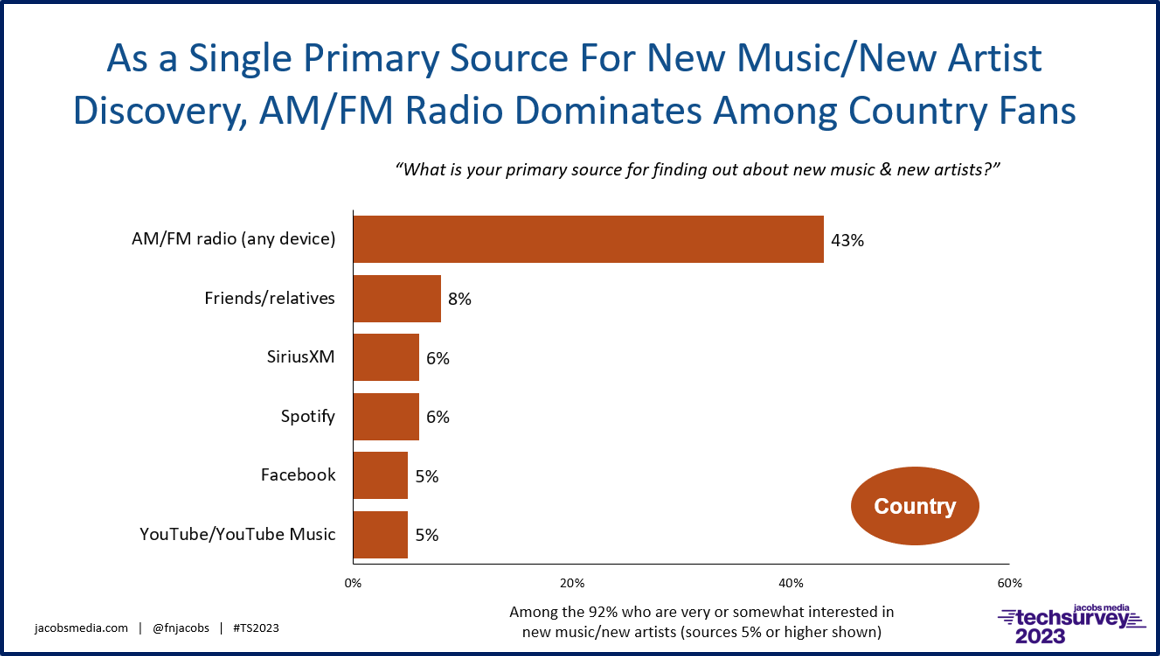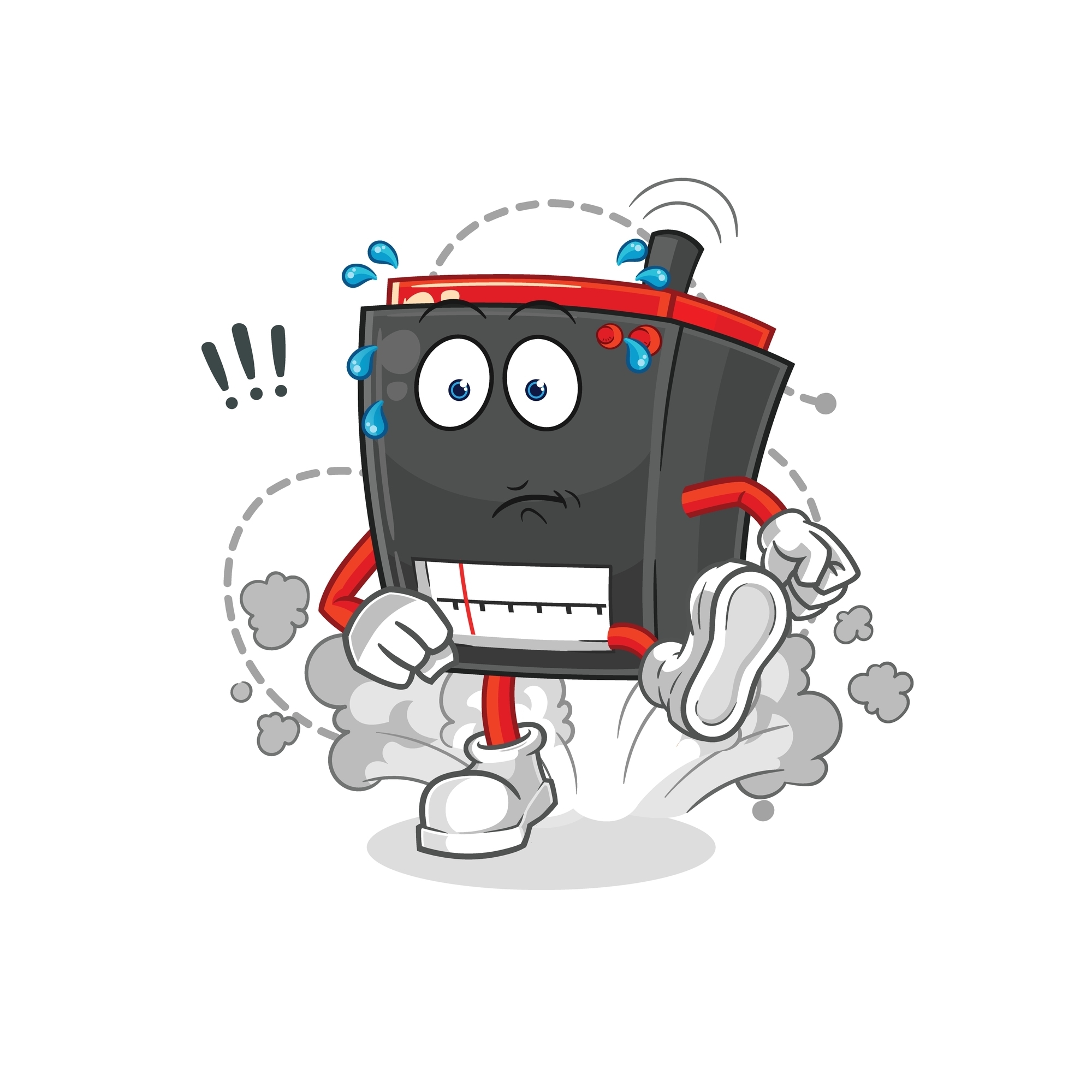‘Radio’s the last thing we talk about,’ say top record label execs
How important is radio to breaking an artist or record? Before the rise of streaming, the answer was an obvious “essential!” But now, the path to success is far less obvious. Fred Jacobs went looking for answers.
by Fred Jacobs of Jacobs Media
Every week, our consultants send me a half dozen or so articles designed to be topic fodder for this blog. And as he does every week, Mike Stern emailed me some pretty good ideas in this weekend’s packet.
But it was the story at the top of the heap that caught my eye – the one with the headline I’m using for today’s blog post.
“Inside the Big Loud Model: ‘Radio’s Honestly the Last Thing We Talk About’”
Big Loud is one of the biggest labels in Country, a team that has developed superstars like Morgan Wallen, HARDY, ERNEST, and new breakout artist, Hailey Whitters.
I read it a second time, and immediately my “radio ninja” mindset took over. Obviously, it was another mega-dis of radio. And it appeared in a highly visible, respected music publication: the new issue of Billboard (behind a paywall, but available here). Time for the nunchucks and throwing stars, right?
The article covered a Nashville panel presented by the Association of Independent Music Publishers at SESAC Nashville, featuring two Big Loud execs, Patch Culbertson and Sara Knabe. And if you read the article carefully – and I initially did not – the discussion wasn’t anti-radio – it was an explanation of the new sequence of how a song/album/artist is promoted in 2023.
Rather than radio being the starting point, digital streams are now the way an artist earns the green light for radio promotion, often expensive, time-consuming, and arduous – as many of us who have programmed a radio station that plays new music knows too well.
But that headline…
Clickbait? Close.
And as I mentioned to Big Loud’s President Greg Thompson yesterday, Billboard’s “come-on” headline designed to attract eyeballs to the story didn’t do the label or its managers any favors.
Greg put Big Loud’s growth and development model in perspective, making the case that it is now about the promotional and marketing sequence and radio’s new position – near the end of the process:
“Radio is very, very important to Big Loud Rock and Big Loud Country and all that we do. We invest substantially in great executives to superserve radio clients because we believe it’s a big part of the equation.
“What I do think is we use data to inform us before we go to radio because campaigns can be long and getting it right is essential. I like to think in today’s ecosystem, good labels go out and build a strong buzz and a level of consumption around a song, so when we partner with radio, it can blow wide open.”
You can admire the diplomatic way that Greg puts it, but that doesn’t change the reality:
Radio’s impact on the breaking music process has diminished and is no longer the tip of the promotional spear. The sequencing of the marketing strategy has changed. Now the proof of a project’s efficacy starts with streaming results (the new data), and if a song makes the cut, the marketing campaign makes its way to radio – but well down the chain of events.
There’s no question radio still matters. It’s just at a different point on the curve. To check that, I dug into Techsurvey 2023 and our 3,100+ Country fans tell an important radio story. More than nine in ten of them are interested in new music and new artists. And radio is their overwhelmingly go-to destination to hear it.

And that level of loyalty to Country radio for new music exposure is higher than for every other music format included in this year’s Techsurvey.
To get more (and better perspective) than mine, I went to some of the smartest people I know in the business, all of whom have vast experience in the Country format.

I started with Larry Rosin, president of Edison Research, someone’s who conducted a vast amount of research in the Country zone. Larry also studies this format, frequently speaking and presenting at Country conferences:
“It is not that long ago where the only way to break an artist was via radio. Now it is pretty widely acknowledged that radio comes last in the ‘process,’ at least in Country radio but I presume in CHR, etc.
“There was a panel at CRS – I think in 2022 – where John Shomby asserted – ‘We no longer make the hits, we validate the hits.’ (That is a paraphrase – I haven’t looked it up). This caused some disagreement and back-and-forth with other country consultants but… it is assuredly true.
“I mean – CHR didn’t play ‘Driver’s License’ until several months after it was one of the biggest YouTube songs of all time and had a zillion plays on Spotify. Olivia Rodrigo was already an enormous ‘recording star’ before radio even touched her. Radio came…last.”

And then there’s the learned Mike McVay who has an incredible vantage point, working with formats, artists, and labels. He’s been EVP/Content & Programming for one of the biggest radio companies and a radio network.
I don’t think anyone is a keener observer of the media world around him than Mike. And he talks to everybody.
Here’s his take:
“Radio is no longer the discovery platform for music that it once was, and that corporate pressure to ‘play it safe’ is the easiest path for a PD to take. Label promotion and marketing budgets for radio are decreasing and that slows the song lifecycle.
“Showing streaming of a song by listeners serves as a form of consumer research which is akin to checking record store sales pre-internet. Radio airplay is still important for a song to move from ‘okay’ to ‘great’ … and that is recognized by labels.
“Radio still matters. Where it sits in the lifecycle of a song has changed.”

Kenny Jay has a fascinating resume, especially for this conversation. He’s programmed prominent Country stations KMPS (Seattle) and WUSN (Chicago). And then he went to work for Big Loud during the pandemic.
Now, he’s a Country consultant for Albright, O’Malley, & Brenner.
“In my PD era, I often worked as a radio partner with Big Loud. In 2019, we spent a half day presenting our annual priorities to each other and working to find the intersections where partnership made sense for everyone.
“During Covid, I went to work for Big Loud, helping launch albums for Morgan Wallen and Hardy. By that time, they had a solid artist development system that was outlined in the article and they stuck to it.
“We listened to many songs that could have been mid-chart records … doubles if we’re talking baseball … but in today’s world labels don’t have resources and radio doesn’t have shelf space for doubles.
“As a programmer, now consultant in the format for over 25 years, I appreciate that Big Loud doesn’t drop the next artist of the moment without that due diligence. The format only has one chart and we’ve seen numerous artists over the years who couldn’t sell a hard ticket and some who may have had a buzz but no clue who they were musically.
“Big Loud works to develop acts that consume, sell, and then break through at radio. Radio was and still is their amplification piece, and coming to radio last benefits everyone.”

Joel Raab is one of the most respected consultants in Country, working with some of the biggest and best stations in the format. Joel concurs in spirit with these other opinions, but also provides a different angle on the evolving promotion cycle:
“What I am hearing is that most labels will not come with a radio single unless they have some digital numbers on the song.
“What I think is more interesting is how songs that weren’t intended to be singles, became singles due to radio playing what we thought was the best song on an album (‘Last Night’ and ‘Thinkin’ Bout Me’ by Morgan Wallen; ‘Fast Car’ by Luke Combs, etc.) There was a time when radio was chastised for not going with the ‘official’ single. No more.
“It’s healthy when a song can make it up the charts organically.
“I contend that to the radio audience, my large weekly sample of tested songs shows that they are mostly unfamiliar until we play them, no matter how many downloads they receive.
“As to your original premise for your article, I was going to say that I feel that most labels (Big Loud included) are still going out of their way to work with radio and be supportive, as apparently, they still need our support, and we’re happy to have theirs. That relationship seems healthy to me.”
Promising confidentiality, one executive who’s worked both sides of the fence – radio and records sees it like this:
“As one very successful major label EVP tells it: ‘Radio is not where we start the music discovery process but it’s still the great finisher.’ Radio makes a huge difference once focused play begins and sustains and grows.
“Translation: labels are more likely to go very slowly out of the gate until the metrics (streaming data, Shazam, etc.) fall into line of their equations of what datapoints indicated a hit.”
That’s a lot of “data” from some high-placed execs who have a unique POV of where the industry is headed.
The good news? That clickbait headline fails to do justice to radio – a medium that still very much holds sway in the minds (and hearts) of music execs and the artists themselves.

But it is naive not to accept that radio’s role in the pecking order has changed for the foreseeable future, if not for all time. Going last has its advantages, of course. But it has its downsides, too.
Expect that 43% of Country fans who turn to their favorite stations first to discover new artists and songs to diminish over time. More and more, streaming has become a key exposure vehicle, especially on dominant destinations like YouTube and Spotify.
Radio has a role to play, an important one. But it is changing, and radio industry execs are going to have to figure out how to leverage it.
Meantime, I’m putting those nunchucks away.
For now.
Thanks to everyone who went out of their way yesterday to school me on this topic, and to contribute their expertise, on and off the record.
President & Founder at Jacobs Media, Fred Jacobs founded Jacobs Media in 1983, and quickly became known for the creation of the Classic Rock radio format. Jacobs Media has consistently walked the walk in the digital space, providing insights and guidance through its well-read national Techsurveys. In 2008, jacapps was launched – a mobile apps company that has designed and built more than 1,300 apps for both the Apple and Android platforms. In 2013, the DASH Conference was created – a mashup of radio and automotive, designed to foster better understanding of the “connected car” and its impact. Along with providing the creative and intellectual direction for the company, Fred consults many of Jacobs Media’s commercial and public radio clients, in addition to media brands looking to thrive in the rapidly changing tech environment. Fred was inducted into the Radio Hall of Fame in 2018.